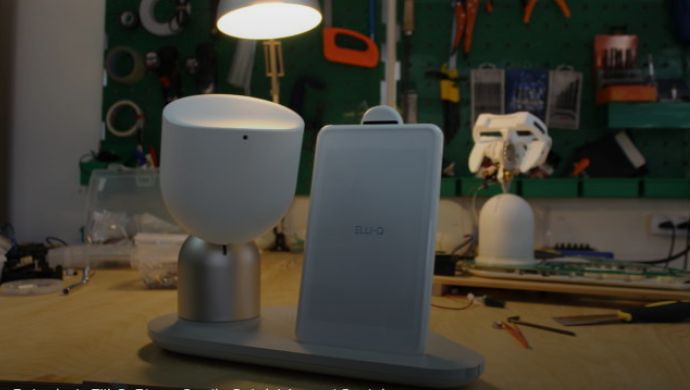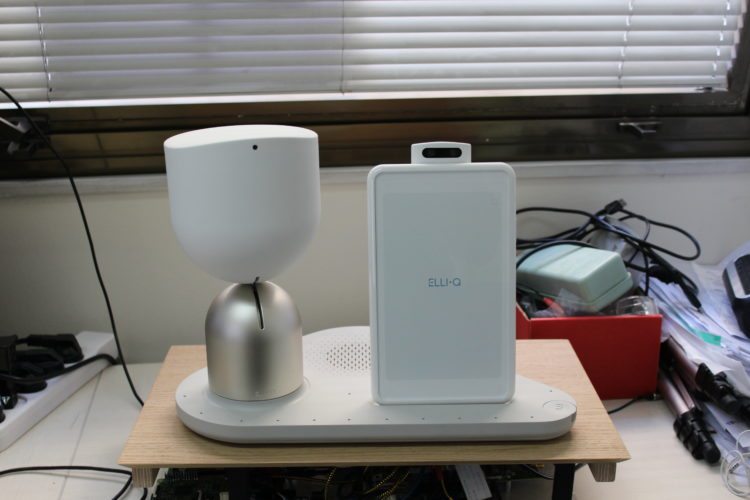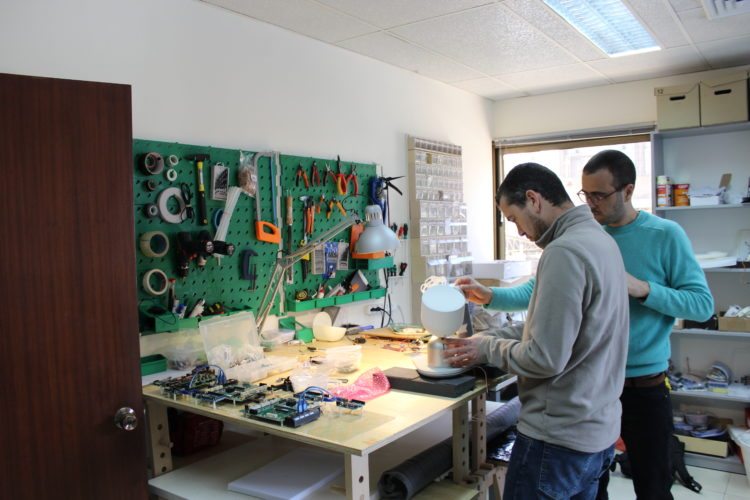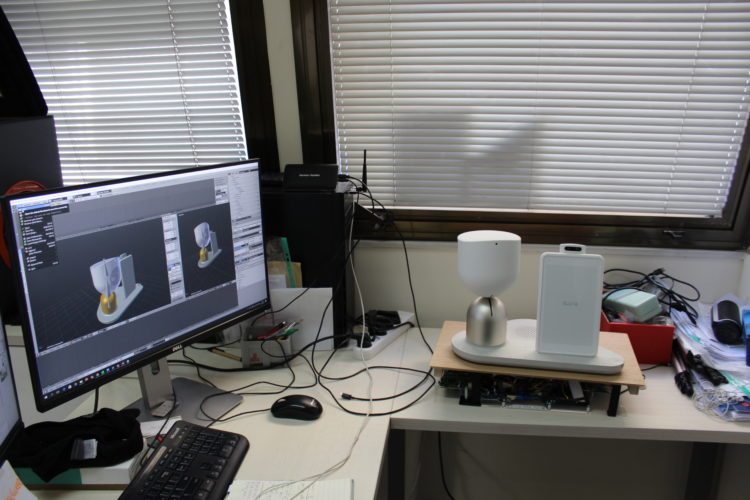Finally, a startup that is decidedly not chasing after millennials

Intuitive Robotics’s Elli•Q. Image Credit: Gabriel Avner / Geektime
Ramat Gan-based Intuition Robotics showed off today for the first time their prototype for Elli•Q, a robotic companion aimed at making the lives of older adults less lonely and more engaging.
The device, whose design came about from a collaboration with Yves Béhar, was unveiled at the Design Museum in London as a part of the New Old: Designing for our Future Selves exhibition.
The company was co-founded in 2016 by CEO Dor Skuler, VP R&D Itai Mendelsohn, and VP Product Roy Amir. The trio had previously worked together at Alcatel-Lucent’s Cloudband, a new business set up by the company to build telecom networks on top of cloud infrastructure, called NFE where Dor served as a senior VP.
They have thus far raised an undisclosed amount of funding from impact investors Terra Venture Partners and Bloomberg Beta, a seed fund in the valley and NY that has a specialty in machine learning and artificial intelligence.
Speaking with Geektime, Skuler says that he and his team wanted to work on a project that would solve a problem in the world. Looking for ideas, they were fascinated by the concept of longevity and how we as a society are meeting the challenge of taking care of our aging parents.
Also Read: MobiDent secures pre-Series A to provide home dental care services in India
What they came up with is a robot and tablet platform that they are calling an active aging companion.
He says that what caught their attention in particular was the issue of loneliness, which he believed was not being fully addressed even as it has become more prominent than it used to be. As people in western societies are living to older ages, with mortality ages rising on average to 78.8 according to the Centers for Disease Control and Prevention in the US, the question is whether they are being properly taken care of.
Modernisation in the workforce and society has had a significant impact on how we live as families, and as such, how we help out our aging parents.
“We used to be born, work, and die within five miles of the same place,” says Skuler. “In the US, people live an average of 12 miles farther away from their parents than they used to. Thanks to modern medicine, we live a relatively healthy life, reaching older ages than before.”
Also Read: [Updated] Go-Jek acquires Indian home healthcare marketplace Pianta
While this might have otherwise been good news, the unfortunate downside is that older adults are left alone for longer periods, with only a few visits from their children to see them every year.
But aren’t we more connected than ever you may ask? Yes and no.
“Technology for us make our lives easier, but make new barriers for older adults because it requires them to learn new skills to complete the simplest of tasks,” says Skuler, explaining that with the rapid pace of advancement in tech, we are constantly changing the way that we engage with entertainment, perform tasks, and communicate.
Simply put, the same device or service that a 12 year-old can pick up and operate instinctively could be exceedingly frustrating for someone in their late 70s.
An optimist, Skuler says that technology has matured to the point that we can build a product that can help bridge the gap, noting that, “We can learn new things when we’re older, but it takes longer.”
Also Read: Japan’s M3 form JV with HealthCare atHOME to launch a news platform for Indian doctors
Meet Elli•Q
In looking to develop technology that would do the most good for older adults, the Intuitive team decided to focus on three major areas of need. It should be pointed out that the Elli•Q device is meant for older adults who can still take care of themselves, remembering the title of active aging companion, so this should not be considered a replacement for a home care worker.
The device itself, packed with sensors, currently has two main parts: the moving robot head and the tablet where most of the interaction occurs.

Intuitive Robotics’s Elli•Q. Image Credit: Gabriel Avner / Geektime
Perhaps the first thing that you notice is that Elli•Q does not have a face. The company felt that giving her one would be dishonest (sort of like calling a table top robot her, but it just sort of feels right and the uncanny valley be damned), seeing as how the device is not alive. Instead of expressions, they leverage gestures, LED lights, and movement in a way that humans recognise in order to make it simpler to interact with.
In looking to make communication easier, Intuition has included a chatbot that is run through Facebook Messenger. By their thinking, they wanted to find a way to make communication more natural between the older adults and their family, the later of which has grown accustomed to the simultaneous chatting experience of Messenger, WhatsApp, Slack, etcetera.
Also Read: India’s home healthcare platform Care24 raises US$4M Series A led by SAIF
Built on a basic Android platform, they can also add in additional modes of communicating like Skype, but through an easier access way that does not require dealing with the frustrating sign in process.
Relying on Natural Language Processing (NLP: the technology that is at the center of most machine learning work these days), Elli•Q can listen and transmit spoken responses or commands from the user with what Intuitive is calling a high level of accuracy.
This machine learning capability is a key part of Elli•Q’s magic, as she learns to interact with her user. Part of this “understanding” that she picks up is about when to deliver a message to the user who, unlike younger generations accustomed to the constant dings of a smartphone that sends pleasure chemicals coursing through our veins to the brain, may prefer to receive non-essential messages at a different pace.
In this way, Elli•Q acts as an arbitrator between the generations, making it more convenient for them to communicate with each other.

Intuitive Robotics’s ElliQ. Image Credit: Gabriel Avner / Geektime
Also Read: Healthcare startup in Indonesia? H-Cube might just be the right coworking space for you
Learning to work with the older adult melts into Elli•Q’s second major function as a motivator and engager. Older adults become more reactive than proactive, sticking to routines and not initiating new activities, so learning what they like and do not is imperative to reach the desired results.
Whereas a more general home assistant like Alexa will wait for your commands, Elli•Q will take the initiative and make suggestions, offering to play an audiobook or a TED talk, or that they watch some TV. It can also try to encourage them to go out for a walk, after checking the weather of course to make sure that this suggestion makes sense.
Skuler drives home the point that if the user does not trust Elli•Q’s suggestions, then they will be disinclined to use it. This is where the connectivity and sensors come into play. If the device hears that the TV has already been on for three hours that day, then it will know not to offer that as an option, similar to how it checks weather reports from the internet.
If the older adult chooses to, they can turn on various monitoring features, including some that relate to wellness. They can choose to do things like notify someone — like an older child — when they woke up in the morning, or what the temperature is in the house.
It can also pick up on abnormalities using sensors like thermometers, propane sensors, computer vision, and microphones. “The combination of multiple actions a day, gives us the potential to be very insightful,” says Skuler.
Also Read: Affordplan raises US$3M to make healthcare affordable through planned savings in India
In taking privacy concerns seriously, he adds that along with built-in encryption, information collected by the computer vision capabilities are not sent off the device, and a wake word similar to “Hey Siri” is needed to activate the microphone.
They made the decision early on that they would not allow e-commerce through Elli•Q. Skuler explains that they were afraid of older adults being taking advantage of, as has often been the case. In the same vein, their policies allow only the older adults to make the changes, using things like the computer vision to identify that only authorized people are making the changes.
Looking down the road a little bit, the company plans to use their Android platform to interact with various APIs in a smart home environment.
They will be opening an office in the valley later this year, and are hiring now for that office. After that they expect that they will hire more for the marketing side as the release date gets closer.
Greater availability of tools make diving into development cheaper and easier
One of the most interesting points raised by speaking with the Intuitive team was how tools like 3D printers and engines like Google’s machine learning, which is now available over the cloud, all lead to a maker culture that is far more accessible for small companies. No longer reserved to making apps or other software, big players like Facebook and Google are opening up their resources so that others do not need to begin building from scratch. This is a change where everything available over the cloud appears to be having a big impact.
Also Read: HaloDoc completes US$13M Series A to bolster Indonesia’s healthcare sector

Intuitive Robotics’s ElliQ. Image Credit: Gabriel Avner / Geektime
For his part, Skuler says that by applying agile development methodologies to their hardware challenges, they succeeded in making multiple prototypes in only 10 months. He adds that the machine learning industry has matured significantly with these ready-made tools. “You have to deal less with the guts than before, now letting you focus more on the learning.”
I will continue to look for more companies leveraging existing resources, while bringing their own special sauce, to make impressive products faster.
My thoughts
Research cited by Linda Grenade and Duncan Boldy in their article “Social isolation and loneliness among older people: issues and future challenges in community and residential settings,” which appeared in the August 2008 issue of the Australian Health Review, has shown that the vast majority of older adults do not experience extreme loneliness. However a significant number of those surveyed, assessed to be between 50-60 per cent, have expressed moderate feelings of loneliness that while perhaps not debilitating, could have their quality of life improved by Elli•Q.
While this product should not be categorised as a medical device, it certainly plays an important role in the health of the older adult. By acting as a reminder to take their pills, stay active at home, and engaging with their mind, Elli•Q is part of a new circle of products that help keeps older adults from deteriorating, let’s them be more independent for longer, and hopefully makes visits to the doctor less frequent. The more basic monitoring that can be done away from the hospital, the better.
Also Read: Malaysian online healthcare platform BookDoc signs MOU with Malaysia Physiotherapy Association
“When you look at the fact that 25-30 per cent of the population will be above 65 in the next 20-25 years, that’s kind of a remarkable number,” says Skuler. “I think that there are not enough startup activities in this space, given the huge demographic shift we’re going through.
“I think that there is a lot of room for products and brands that celebrate aging and treat older adults in a dignified manner,” he adds, and not just focusing on disabilities or severe health problems.
Having chatted with the Skuler and his team, I got the sense that these are people who care deeply about solving a societal problem, and have a better grasp on the technology that will lead them to the right solutions than most other companies out there claiming to be running AI.
This is far from an easy task ahead for the Intuition team. While they are unveiling their prototype today, it is still very much in the development stage and should be treated as such. Simply creating a device that can move around and light up to give the user the feeling that there is something alive in their home is the easy part. Reaching the level of AI that Skuler believes that his team can achieve will be significantly harder and require a large amount of trial and error that could push off the final delivery of this product. The trick to machine learning, and eventually AI, is that smart algorithms are not enough. You need to allow for your technology to study enough examples and actually learn.
This shouldn’t be taken as a knock, but as a smart way of building a product for a generation that is already more easily frustrated with technology. If Intuition is going to put out a product whose purpose is to have positive engagement with older folks, it will have to do a lot of learning between now and then, figuring out how to encourage and delight while avoiding annoyance. Again, no simple task when they need to do this for every different user.
Also Read: UNFRAMED unveils 6 new Singaporean startups targetting eldercare
As they continue to develop, I would hope to see them integrate more features into the product. Next month in February, they plan on starting at-home trials in San Francisco, where they will get some much needed feedback. One item that I would add to this list is picking up on emotions from the older adult, giving the device added crucial information to provide more appropriate responses.
In looking for competition in the market, it would be unfair to compare Elli•Q to robots like SoftBank’s Pepper, or others like Jibo which is also yet to make its debut, since Intuition’s device is dedicated towards assisting older adults, and not a general purpose bot.
As excited as I am about seeing Elli•Q when it finally hits the stage, it is important to remember that it does not replace the role of the grown child to help their parents; it is just a gateway to the family.
“We hope that it will allow the family to become closer together, communicate more often, and share content with each other,’ says Skuler, admonishing that, “It won’t be able to help with loneliness if there isn’t a family member on the other end.”
—
The article Israeli Intuition Robotics unveils ‘Elli•Q’, your grandma’s new best friend first appeared in Geektime.
The post Israeli Intuition Robotics unveils ‘Elli•Q’, your grandma’s new best friend appeared first on e27.